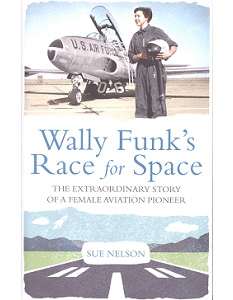What do you do as a biographer when all the biographies of famous astronauts have been written? You look for the people who managed the astronaut programmes or worked behind the scenes or otherwise avoided the publicity machine. This book is the story of someone who could have been an astronaut but, arguably because she was born too soon, didn’t make it into space.
Mary Wallace (Wally) Funk was, according to the author, “determined to become one of the first women in space” and, as one of the so-called “Mercury 13”, undertook the same medical tests as the famous “Mercury 7” that flew the eponymous one-man American space capsules in the 1960s. Unfortunately, says the author, “a combination of politics and prejudice meant that none of the Mercury 13 ever flew into space”.
In this book, journalist Sue Nelson tells what its subtitle describes as “the extraordinary story of a female aviation pioneer” from her early exploits to her current dreams. Now 80, Wally Funk still hopes to get into space aboard one of Virgin Galactic’s suborbital flights but, as Nelson points out, it’s “a race against time”.
The book is written partly from the author’s perspective of her meetings with the subject, which adds an immediacy not present in most biographies…and from the first chapter it’s a wild ride. Nelson shouts at Funk to keep her “hands on the wheel” rather than groping around the back seat, worries over the “hundreds of loose photographs and highly flammable newspaper cuttings” on the electric hob, and accuses her of “unwittingly” trying to kill her several times. It’s impossible not to be carried along on the journey.
The author admits her surprise that, despite her own best efforts, the role of the Mercury 13 is not more widely known. This book should help in that regard, not least by bringing the remarkable Wally Funk to our collective attention.











